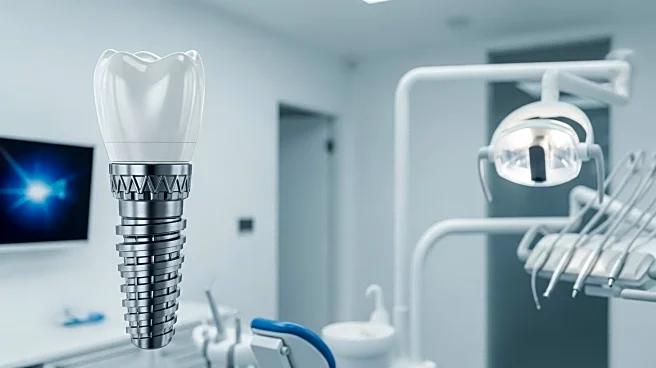What's Happening?
Theradaptive, Inc. has initiated the RESTORE International Phase I/II Feasibility Study to evaluate OsteoAdapt DE, a regenerative product designed to promote bone growth in dental procedures. The study aims to assess the safety and performance of OsteoAdapt DE in alveolar ridge augmentation, a critical procedure for dental implant placement. The product utilizes Theradaptive's AMP2 technology, which targets stem cell recruitment and accelerates bone formation. The study is supported by the Armed Forces Institute of Regenerative Medicine and funded by the Department of Defense, highlighting its potential application in treating traumatic battlefield injuries.
Why It's Important?
The development of OsteoAdapt DE represents a significant advancement in regenerative medicine, particularly for dental and craniomaxillofacial repair. The technology could improve surgical outcomes by reducing healing time and minimizing residual graft material, which often leads to complications. The study's support from military institutions underscores its potential impact on treating combat-related injuries, offering a promising solution for jaw restoration following fractures or oncology resections. Success in this study could pave the way for broader applications in spine, orthopedics, and sports medicine, enhancing patient care across various medical fields.
What's Next?
The RESTORE trial will continue to evaluate OsteoAdapt DE against standard xenograft bone grafts, with the goal of demonstrating its effectiveness in promoting targeted bone regeneration. The study's findings could lead to further clinical trials and eventual FDA approval, expanding the use of OsteoAdapt DE in dental and other medical procedures. Theradaptive's broader bone regeneration program is expected to attract interest from strategic partners, potentially leading to collaborations that advance the technology's application in diverse therapeutic areas.
Beyond the Headlines
The study raises questions about the ethical implications of using advanced regenerative technologies in medical practice. While the potential benefits are significant, there is a need for careful consideration of the long-term effects and possible risks associated with such interventions. The collaboration between Theradaptive and military institutions also highlights the intersection of medical innovation and defense priorities, suggesting a growing interest in leveraging biotechnology for military applications.









